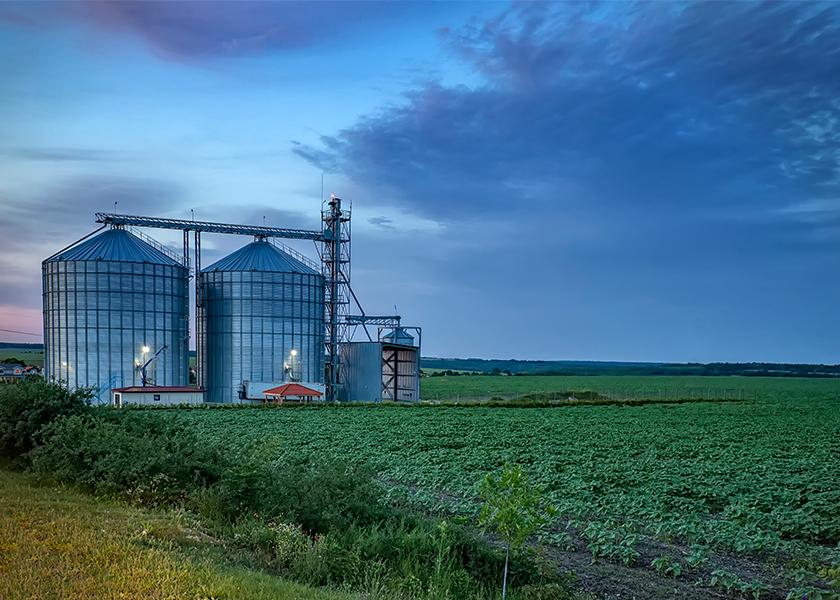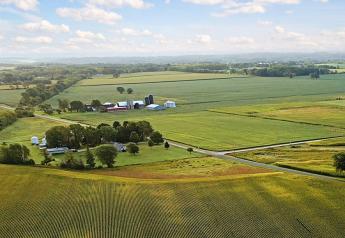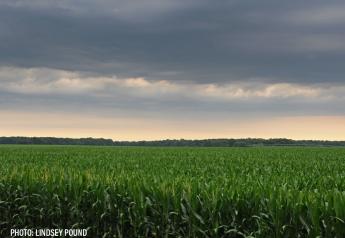Evening Report | June 17, 2021

Click here for weekly export sales charts and here for report highlights.
Check our advice monitor on ProFarmer.com for updates to our marketing plan.
Heat to continue through September… The National Weather Service (NWS) is calling for above-normal temperatures over most of the country during the July through September period. The exception is a bubble from extreme southern Iowa to the Gulf of Mexico, for which NWS predicts “equal chances” for normal, above- and below-normal temperatures.
The extended forecast favors above-normal rainfall over most of the eastern Corn Belt down through the Southeast. The rest of the Corn Belt has mostly “equal chances” on precip, though a bubble of below-normal precip is expected north and west of the western Corn Belt.
Warm temperatures are also expected for the Northern Plains and all but far southern areas of the Midwest during July. NWS says there are equal chances for normal, above- and below normal temperatures for the Central and Southern Plains and into the Southeast.
The precipitation map for July is rather noncommittal, with a patch of below-normal precipitation likely from the Pacific Northwest to the Dakotas and for the southeastern quarter of the country, including far southern areas of the eastern Corn Belt. Elsewhere, there are equal chances for normal, above- and below-normal precipitation. Find the related maps here.
On the other hand, rain helped kept drought/dryness from encroaching in northern areas of Wisconsin, the Michigan Upper Peninsula, and the Ohio River Valley.
On the High Plains, precipitation varied widely over the past week, though temperatures were consistently warm. Today’s update says, “A few areas in the western half of North Dakota received enough rain from several thunderstorm events to improve their drought status, though this primarily occurred in areas with very heavy rain amounts (some locales received over 5 inches). For the most part, while welcome, the heavy rains have come after months of warm and dry conditions, and the widespread severe, extreme, and exceptional drought has been slow to improve as impacts to plants and livestock continue. In north-central and northeast South Dakota, and adjacent portions of North Dakota, moderate and severe drought expanded.”
Winter wheat producing areas from Kansas through Texas are largely free of drought. Find related maps here.
Brazil makes it easier to import GMO corn and soy from the U.S.… Brazil’s government published a new regulation today that would align rules for genetically modified crops with global standards. Specifically, the new rule will allow crops with different genetic modifications to be transported in the same ship, so long as each individual modification has already been approved. The ag lobby says this will make it easier to bring in more GMO corn and soybeans from the U.S., though export sources don’t expect big inflows from the U.S. as shipments from Paraguay and Argentina have a price advantage.
Argentine port workers planning to launch a 24-hour strike at midnight… Nine port worker union groups in Argentina will launch a nationwide, 24-hour strike at midnight, renewing the push for worker vaccinations, the coalition of unions said in a statement today. The unions say they have held meetings with various authorities, “But to date, we have not obtained concrete answers or solutions.”
“We will not be able to moor and unmoor cargo ships, so that will impact loading,” Guillermo Wade, manager of Argentina's Chamber of Port and Maritime Activities, told Reuters.
Five port industry chambers are asking the government to intervene to prevent the strike. Operations at Argentina’s main Rosario port hub were disrupted by similar work stoppages last month. The work stoppages come right in the midst of corn and soybean harvest.
Is Vilsack hinting at a reduction in RFS levels?... Remarks by USDA Secretary Tom Vilsack on AgriTalk yesterday regarding the Renewable Fuel Standard (RFS) blending levels being worked on by EPA are causing some concern with biofuel backers. Asked about reports EPA was considering lowering RFS blending mandates and may be considering new small refinery exemptions (SREs), Vilsack told the program EPA is dealing “with a tough situation over there, because they are dealing with the consequences of decisions that were made in the previous administration in terms of what happened in 2020 and what's happening in 2021.”
But what sparked more concern is a comment Vilsack made on the coming 2021 and 2022 biofuel levels. “It's going to be important before we make judgment about this, to take a look at the total package, to see exactly where we are at the end of the day,” Vilsack said. He also said his agency has expressed the need for the biofuel industry to be supported and noted biofuels will play a major role in the administration’s climate change efforts. But his remarks on looking at the “total package” on the RFS levels has spawned concern there may be some credence to reports EPA may lower biofuel blending levels, including for conventional (primarily corn-based) ethanol.
EPA has targeted July for releasing the proposed RFS levels and is seeking to finalize them by Nov. 30. However, EPA has not yet sent the proposed levels to the Office of Management and Budget for review.
Democratic lawmakers push EPA on reports of RFS waivers... A group of House and Senate Democrats are calling on EPA to not take any actions to waive RFS requirements for some refiners as some media reports have suggested. While expressing support for the administration’s efforts on climate change, the lawmakers said in the letter to EPA Administrator Michael Regan and National Economic Council Director Brian Deese that they are “concerned that rolling back the RFS obligation for refiners directly contradicts this work. Following through on the actions reportedly under discussion would directly undermine your commitment to address climate change and restore integrity to the RFS and we urge you to reject them.”
China issues new rules on the management of price indexes for commodities and services… China will issue new rules regarding the management of price indexes for commodities and services that standardize how price indexes are compiled and improve transparency on the release of information, the National Development and Reform Commission said. Under the new rules, price index providers will need to be independent of direct stakeholders in the commodity and service markets covered by the index. Changes will take effect Aug. 1.
This comes just a week after NDRC indicated it would increase scrutiny of commodity prices and increase market supervision. The country has increasingly worked to crack down on speculation in the ag markets, with inflation and food security an increasing concern.
U.S./U.K. announce five-year suspension of tariffs in civilian aircraft dispute. Following on the lines of the compromise announced earlier this week with the European Union (EU), the U.S. and U.K. reached agreement to suspend tariffs they have imposed over the Airbus/Boeing dispute. The agreement with the U.K. is said to be nearly identical to the one reached with the EU earlier this week on the topic. The U.S./U.K. accord includes establishing a working group on large civil aircraft with each side agreeing to provide any financing to aircraft firms will be “on market terms” and that research and development funding will be provided “though an open and transparent process.” The two will also jointly analyze and address “non-market practices of third parties that may harm their respective large civil aircraft industries.” The five-year tariff suspension applies from July 4.
Rural bankers note strong local economies… For the seventh straight month, the Creighton University Rural Mainstreet Index (RMI) remained above growth-neutral. The monthly survey of bank CEOs in rural areas of a 10-state region dependent on agriculture and/or energy resulted in the overall index falling from May’s record high of 78.8 to a still-strong 70.0 in June. The index ranges between 0 and 100 with a reading of 50.0 representing growth-neutral. Nearly 47% of bank CEOs report their local economy expanded between May and June.
“Strong grain prices, the Federal Reserve’s record-low interest rates, and growing exports have underpinned the rural mainstreet economy. Even so, current rural economic activity remains below pre-pandemic levels,” says Creighton University’s Ernie Goss, who conducts the survey.
However, several bankers raised future concerns, he notes. Steve Simon, CEO of South Story Bank and Trust in Huxley, Iowa, reports, “Continued dry conditions will start to have an effect on markets and crops soon.” More than three-fourths of the bankers think the Federal Reserve should begin raising interest rates before the end of 2021. Find more details.






